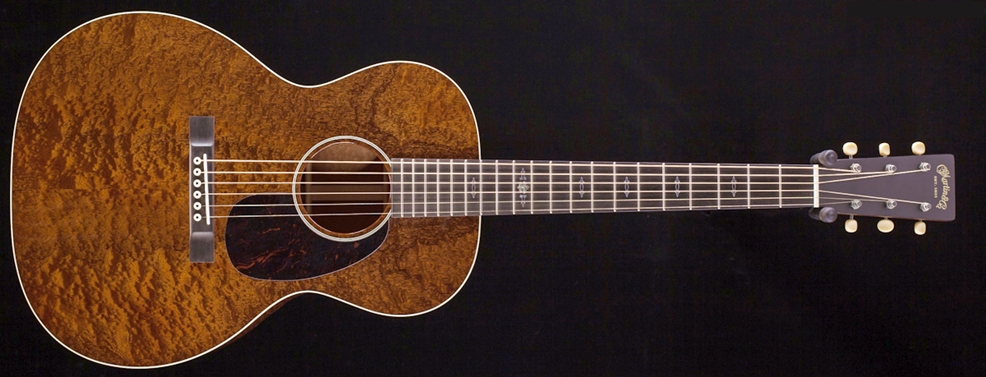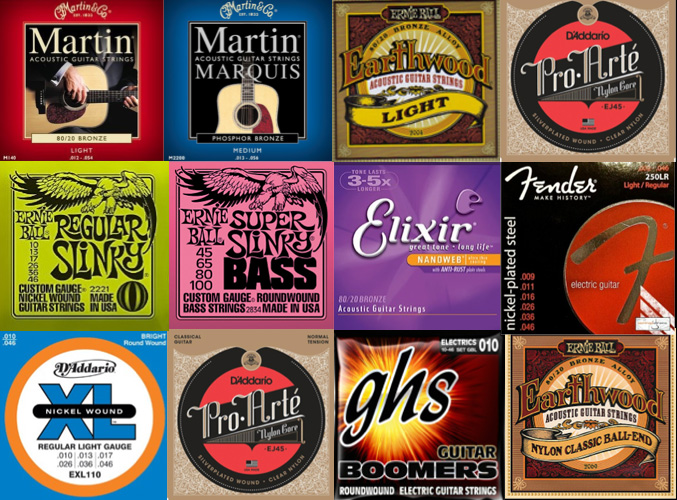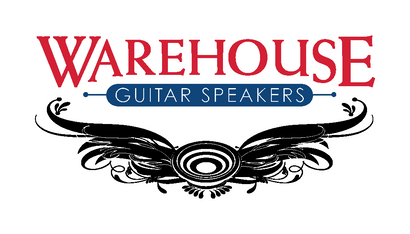Your Cart is Empty
NOW FREE SHIPPING TO 48 CONTIGUOUS UNITED STATES ON ALL ORDERS!!!
Which Strings are Best & What Should I Buy For My Acoustic Guitar
by vaughn skow February 02, 2018 5 min read
Howdy once again tone seeking buddies! Last blog we talked about what strings are best for your ELECTRIC, this week we'll discus ACOUSTIC guitar strings. And once again, this will be an important blog to many of you, especially if you are still a little uncertain of just what exactly the plethora of string options really means where it counts ,,, on your guitar, in your hands, and through your rig! I've learned a thing or two in my decades as a recording engineer, record producer, and of course professional guitar player, I LOVE sharing what I've learned, so listen up grasshopper!

Okay, first let's talk BRANDS. Once again I'll simply mention that while there are many dozens of "Brands" of strings out there, there are only a small handful of companies that actually MAKE strings, and so I don't see the "brand" printed on the package as being all important; believe me, if you run across "Billy Gibbons" or Carlos Santana" strings, they are not made by the guitarists themselves! Nuff said. I will, however, list the brands that I have consistently had good experiences with; the DETAILED factors that effect TONE will be discussed in a moment, what I'm talking about is 1) consistency, 2) secure and dependable ball ends that don't unravel or break, 3) no unusual levels of string breakage, and 4) acceptable longevity, without excessive susceptibility to corrosion. With regard to these factors, here are the THREE brands I have came to TRUST in acoustic strings in my four decades of tone-seeking:
- D'Addario - Currently my #1 choice in electric AND acoustic strings
- Cleartone - some of the finest coating material out there
- Martin - Not my #1 pick, but never a BAD choice, their strings are usually made by other companies.

Now an easy one: String Gauge (size): Once again, let's set the record straight right here and now: one size does NOT fit all there is no string size that's right for EVERYBODY! My suggestion is to go with what feels best to YOU, seriously, that's the only way you'll play your best, right? Okay, there is a little more to it, and here are the must-know bullet points to string size (some info is the same as with electric strings):
- Fat strings work best with big frets! Again I reference SRV, who used huge frets with his huge strings.
- Skinny Strings work best with small frets. If you were to put tiny strings on a Strat with huge frets, you'd never play in tune!
- Fat strings are louder. But, they require higher action and strong fingers!
- Skinny strings are quieter and thinner sounding. But, they are sooo much easier on the fingers and hands!
So, here are my general recommendations:
- Go with medium to medium light gauge: if you want the best tone and are not playing 8-hours a day on a cruise ship!
- Go with light to extra-light gauge: If you are playing long sets and/or playing an acoustic/electric where the acoustic sound isn't really heard anyway..
- Never go with heavy gauge: Unless you want to pull the bridge off your guitar and warp it's neck. Hey, there is a reason why every Martin since about 1940 has had "Use medium gauge or lighter strings only" burned into a prominent position on the guitar!
How about MATERIAL? Okay, again this is not to difficult. The most standard composition of (non classical) acoustic guitar strings is plain steel non-wound strings (typically the three high strings) and a bronze plated steel wrap on the wound strings (usually the three low strings). And, yep, I have found this standard to be the best for 90% of players and situations. Pure bronze wrap produces a brighter tone but it ages and looses it's tone quickly. Phosphor bronze is a formulation that does not tarnish and loose it's tone as quickly ... but there is a down-side: it's tone is NEVER as bright and lively as 80/20 bronze; they actually start out sounding like bronze strings sound after having been played for a couple of shows! Personally, I've never encountered "coated" ELECTRICstrings that made me want to switch to them, they just get too gunky on a sweaty stage and don't really provide any longer life. However ... and this is important ... Acoustic strings are another matter altogether! Because the actual tone of the strings is paramount to the tone of the guitar, you basically have two choices: 1) change your strings prety much every session or gig or 2) use coated strings. Yes, it's true that the first coated acoustic strings to come on the marked jut flat sucked, they were strange feeling and the coating flaked off and made one heckuva mess. Today, however, that has changed, thank god for advances in polymer technology. And so, I almost always use coated strings on my (many) acoustic guitars, otherwise it would be impossible for me to keep fresh strings on them all! I do have some tips, of course.
Here is the summary:
- Bronze (usually 80/20) are the BRIGHT strings. But ... they tarnish and go dull the fastest! Great strings for recording, change before every session.
- Phosphor/Bronze is not as bright as 80/20 bronze. But they do not tarnish and dull as fast! A best choice if you can't fathom coated strings and/or your guitar is a little on the bright side anyway.
- Acoustic strings generally need to be changed often. Since the tone of the strings matters HUGELY to the tone of the guitar.
- GOOD coated strings are wonderful. For the reason stated above, it prolongs string life! The coating generally dulls the strings just a tiny bit, and so I pretty much always use 80/20 bronze coated strings!
Lastly, the esoteric stuff: Personally, I'd like to call this "marketing BS"! Okay, truth: I have certainly found some "alternative" acoustic strings with undeniable advantages.
- Flexible cores (silk and steel): I LOVE the Martin Flex Core SP strings (pictured above)! They are not right for many situations, but if I get a gig strolling around playing solo acoustic for 12 hours, these will be on the guitar ... they feel sooo luxurious!
- Cryogenic treated strings: Nope, sound HARSH and brital.
- Balanced Tension sets: These basically are just a slightly different mix of gauges; if you like the feel, go for it.
- Unusually hard metals: Weather it's stainless steel, titanium, chrome, or so on ... I have despised them all, plus I had a buddy run Stainless Steels on his Tele and grooved the frets beyond being playable in just a few gigs. Avoid!!!
-
"Boutique" strings by micro manufacturers: I LOVE boutique products, but sorry ... guitar strings are the one (maybe the only) product where I see CONSISTENCY as the most important single quality ... and sadly a well tuned CNC machine can wrap mile after mile of wire waaaaay more consistent than a boutique builder.
There ya have it ... my 40-yrs or so of string experience boiled down to one small blog! Feel free to disagree, and feel free to voice those feelings here as a comment.
email Vaughn About Vaughn Skow

Leave a comment
Comments will be approved before showing up.
